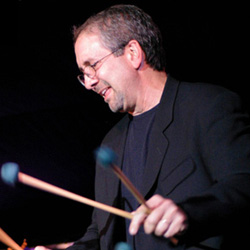
SG: Are you still teaching?
DS: I am teaching part-time up there, yeah.
SG: Okay, great. So, one of the biggest ways you’ve gained fame and notoriety in the music business was being part of Spyro Gyra.
When did you become part of that group?
DS: I met the guys in Spyro when they were a local bar band in 1977 in a club in Buffalo called the Trafalmador Cafe, a fantastic club that not only featured great music, but also stand-up comics and folk music.
Buffalo was an amazing city at that time. They came up to me when I was playing there with a local rhythm section.
Jay Beckenstein and Jeremy Wall, came up to me and said, “Look, we have this local band in the Buffalo area called Spyro Gyra.” (I had no idea what that was; it sounded like a disease.)
“And, we’d like you to play marimba on a couple of tracks, it’s a self- produced record.” I knew the club owner, so I asked him, “What kind of group is this?” and he said, “Oh, no, they’re really great guys, you should do it. That’s really fantastic.”
So, I recorded a few tunes on their very first record titled Spyro Gyra, which was sold locally in the Buffalo/Rochester area. That eventually got sold to MCA.
They came down to New York, which was where I was living a couple of years later, and said, “We’re making a record now for MCA Records and we’d like you to come and play on some tunes.”
So, I went in the studio and played marimba and vibes and some steel drums. That was the record Morning Dance, which became a huge hit. I continued playing on their records every year, every year and a half until 1984, which is when I started touring with them.
SG: Did you ever find out what the name meant?
DS: Well, Spyro Gyra is actually an incorrect spelling of an algae. It actually should be S-P-I- R-O. The guy, Jay, who was asked by a club owner, “What are we gonna call this? We can’t just call this ‘Thursday Night Jazz Band.’” He said, “I don’t care, call it Spyro Gyra.” And, that’s how the club owner spelled it, and it stuck. That’s the real origin of the name. Another way of looking at it is “Pond Scum.”
SG: I guess it gets us back to your origins.
DS: Yes it does! I was out on the road with them for 13 or 14 years. It was a real family, and the family was not just the musicians but also the people in the crew and the people who worked in the office. It was a really great experience.
SG: Eventually, I think in the early ‘90s, did you form the Caribbean Jazz Project?
DS: I formed that in 1993 and actually left Spyro in 1994.
SG: What was your inspiration for creating the new group?
DS: There was a concert promoter who’s still around by the name of Julie Lokin, who called me about putting a group together for a series that he was doing at the Central Park Zoo, right in front of the seal tank. I called Narell, Andy Narell, whom I had done some work with. I had met Paquito in a couple of airports, but we’d never had a chance to play together.
I was very enamored by, not just his music but him as a person; he was a very warm and funny guy. I picked up the phone and called him and said, “Look, I’ve got this date, and would you be interested in doing it? It’s kind of an unusual instrumentation.
I have no idea of what it’s gonna sound like, but how about joining in?” He is always open for a new experience and a new musical challenge. He’s a very open-minded individual, which is one of his great qualities, one of his many great qualities.
So we got together, we rehearsed for a day and then went out and played, and afterwards, it was kind of like “Hey, this was an unusual sound, and unusual concept.” About six months later we did another performance at the Kentucky Center for the Arts in Louisville, and at that point we decided, “Maybe we should see if there’s a record company out there and a booking agent who would be interested.”
That’s when things started to fall into place. Then, we worked together a lot for about five or six years. Paquito decided to go back to do more stuff on his own, and eventually Andy left. And, I kind of took a year off and then reformed the group.
